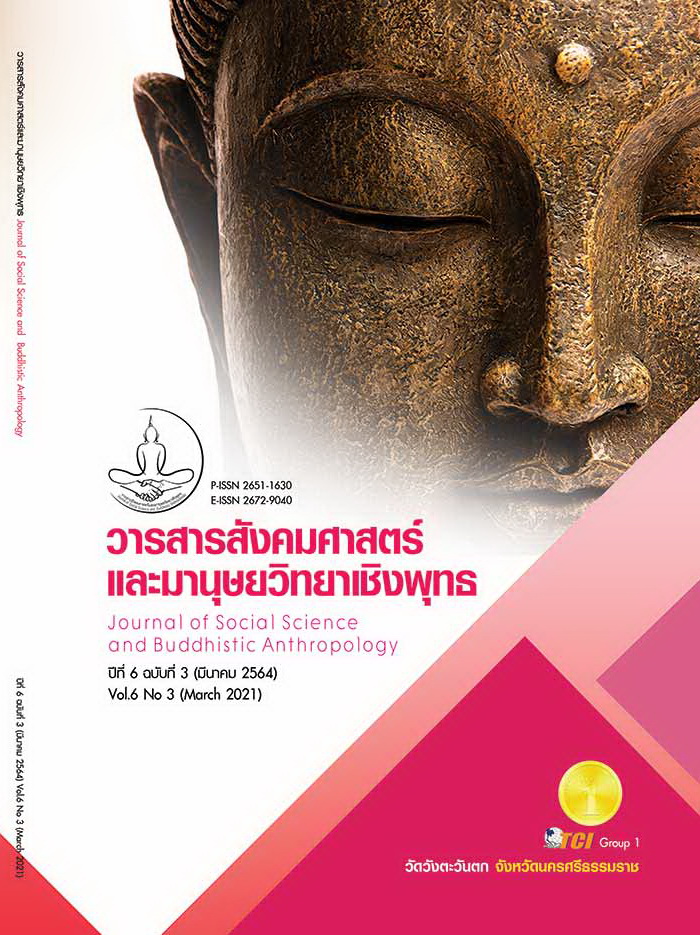CREATING AND DEVELOPING THE CITIZENSHIP UNDER DEMOCRATIC REGIME
Keywords:
Citizenship, Government, Democratic RegimeAbstract
The Objectives of this research article were to 1) study the context of problems of citizenship development under democracy. 2) study guidelines for the development of citizenship under democracy and 3) present guidelines for the development of citizenship under a democratic system in line with the Thai social context. Use qualitative research methods Data was collected through Documentary Research and In-Depth Interview from Key Informants who are skilled and experienced personnel to create and develop 17 citizens The data were analyzed by interpreting and creating hefty conclusions. Inductive Analysis The results showed that 1) Problems of citizenship development under the democratic regime of Thailand consist of citizenship culture building problems. The problem of centralized state of power Problems of Thai political dynamics in history Problems with the sponsorship system, and The problem of lack of recruiting to build citizenship 2) Guidelines for the development of citizenship under the democratic regime of Thailand Including the creation of citizenship development and building a citizen culture as a national strategy. There are constitutional provisions that are in constant force. And educational institutions and citizenship development under the democratic regime of Thailand 3) Guidelines for the development of citizenship under a democratic system in accordance with the Thai social context. This includes developing citizenship based on western thinking, giving citizens the right and responsibility, to enjoy freedom. Having political participation as a member of the state Citizenship development according to the Buddhist principles according to the principles of prayer in 4 areas which are the four aspects of prayer consisted of Civic Physical, Prayana (Civic Skill), Mind Bhavana (Civic Virtue), and Panya Phawana (Civic Knowledge).
References
คณะอนุกรรมการนโยบายปฏิรูปการศึกษาในทศวรรษที่สอง ด้านพัฒนาการศึกษาเพื่อสร้างความเป็นพลเมืองดี. (2554). ยุทธศาสตร์พัฒนาการศึกษาเพื่อสร้างความเป็นพลเมือง พ.ศ.2553-2561. กรุงเทพมหานคร: สำนักนโยบายด้านพัฒนาคุณภาพและมาตรฐานการศึกษาสำนักงานเลขาธิการสภาการศึกษา กระทรวงศึกษาธิการ.
ณฤทธิ์ จันทนวรรณ. (2558). ความเป็นพลเมืองในระบอบประชาธิปไตย:กรณีศึกษานักศึกษา มหาวิทยาลัยรามคําแหง ระดับปริญญาตรี ส่วนกลาง. ใน ดุษฎีนิพนธ์รัฐศาสตรดุษฎีบัณฑิต สาขาวิชาการเมืองการปกครอง. มหาวิทยาลัยรามคำแหง.
ทิพย์พาพร ตันติสุนทร. (2554). การศึกษาเพื่อสร้างพลเมือง. กรุงเทพมหานคร: สถาบันนโยบายศึกษา.
ธีรวัฒน์ วงศ์วรัญญู. (2561). รายงานการวิจัยผลกระทบของระบบอุปถัมภ์ในหน่วยงานราชการต่อการปฏิบัติหน้าที่ของข้าราชการในจังหวัดเลย. ใน รายงานการวิจัย. มหาวิทยาลัยราชภัฏเลย.
ปริญญา เทวานฤมิตรกุล. (2555). การศึกษาเพื่อสร้างพลเมือง. กรุงเทพมหานคร: นานมีบุคศ์พับลิชั่นส์.
พิสิษฐิกุล แก้วงาม. (2553). มโนทัศน์ที่สำคัญในวิชาการพัฒนาการเมือง มหาสารคาม. ใน วิทยานิพนธ์กฎหมายและการปกครองมหาบัณฑิต สาขาวิชารัฐศาสตร์ . มหาวิทยาลัยราชภัฏมหาสารคาม.
ไพบูลย์ โพธิ์หวังประสิทธิ์. (2558). หน่วยตัวแทนและวิธีการของการกล่อมเกลาทางการเมืองของประชาชนไทย. วารสารวิชาการมหาวิทยาลัยฟาร์อีสเทอร์น, 8(2),6 - 17.
มหาจุฬาลงกรณราชวิทยาลัย. (2539). พระไตรปิฎกภาษาไทย ฉบับมหาจุฬาลงกรณราชวิทยาลัย. กรุงเทพมหานคร: โรงพิมพ์มหาจุฬาลงกรณราชวิทยาลัย.
วิศาล ศรีมหาวโร. (2563). ยุทธศาสตร์การพัฒนาศักยภาพความเป็นพลเมืองในระบอบประชาธิปไตย: กรณีศึกษาเยาวชนจังหวัดสุราษฎร์ธานี. วารสารราชภัฏสุราษฎร์ธานี, 7(1),148 - 165.
สมคิด เลิศไพฑูรย์. (2550). กฎหมายการปกครองท้องถิ่น. กรุงเทพมหานคร: ธรรกมลการพิมพ์.
สำนักงานเลขาธิการสภาผู้แทนราษฎร. (2555). ความเป็นพลเมืองในระบอบประชาธิปไตย. กรุงเทพมหานคร: สำนักการพิมพ์สำนักงานเลขาธิการสภาผู้แทนราษฎร.
อเนก เหล่าธรรมทัศน์. (2554). การเมืองภาคพลเมือง. กรุงเทพมหานคร: สถาบันพระปกเกล้า.
Mehran, K. (1996). Understanding Comparative Politics: a framework for analysis. London and New York: Routledge.









